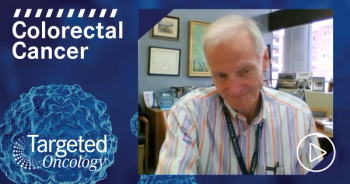
A Case of Recurrent Colorectal Cancer
Tanios Bekaii-Saab, MD, FACP:Mr. Smith is a 62-year-old patient presenting with recurrent colorectal cancer. The patient initially was diagnosed at age 55 when he presented with near obstruction. The patient had a colonoscopy at the time, showed a right-sided tumor that was also ulcerated and somewhat obstructing. He went to the operating room, this was resected. It was found to be a T3N1, and no evidence of metastatic disease at the time. He received adjuvant FOLFOX, did well for a while, and then presented back at age 62 with elevated liver function tests. There was a concern that his cancer was recurrent. He got a PET/CT, which showed multiple lesions of the liver, nowhere else at the time. A biopsy of one of the liver lesions suggested that this was a poorly-differentiated adenocarcinoma very consistent with colon primary, so very consistent with his cancer that was diagnosed a few years prior.
Genomic analysis showed evidence ofKRAS,NRASwild-type, as well asBRAFwild-type, and this was a microsatellite-stable tumor. We went digging a little bit into his family history and his social history, the patient was a previous smoker. He was somewhat obese. His family didn’t carry any history of cancer that would put him at risk.
A discussion with the patient ensued. The patient had previously been exposed to FOLFOX and the decision was to start him on FOLFIRI and bevacizumab. Note that the patient had residual grade 1 neuropathy, which was very tolerable. But we decided anyways to proceed with FOLFIRI/bevacizumab.
The patient is somewhat in the younger category of patients. Although, above ages 50 and 55, we expect the risk of colorectal cancer to increase. In digging into the history of the patient, there’s not much that actually put him at a risk from the genetic or inherited risk factors. Of course, issues like obesity, perhaps smoking, processed meat consumption, and overconsumption, all these have somewhat been associated with an increase of colorectal cancer. But overall, I think given the age of the patient, he falls in what we call the low-risk category for developing colon cancer, and just looking at the risk factors, we think that there are very few identifiable other than loosely, again, obesity or history of smoking.
Transcript edited for clarity.
January 2017
A 62-year-old African-American man presented with recurrent CRC
- Diagnosed at age 55 with stage 3 CRC, treated with surgery and adjuvant FOLFOX
- He underwent colonoscopy with biopsy
- 6-cm ulcerated non-obstructive mass noted in the right colon
- Pathology confirmed poorly-differentiated adenocarcinoma
- Staging; T3N1M0
- History
- Former smoker, 1 pack a day; quit 20 years ago
- Obese, BMI = 30.2 kg/m2
- Mother had inflammatory bowel disease, died at age 70
- Other medications: metoprolol for hypertension, omeprazole, regular NSAID use
- PET/CT scan showed recurrent disease with multiple metastases in liver
- CEA, 28.4 ng/mL
- Biopsy of liver lesions suggests poorly-differentiated with colon primary
- Mutation analysis;KRASandNRAS,WT;BRAF-wild-type; microsatellite-stable
- He was started on FOLFIRI with bevacizumab and achieved partial response
January 2018
- The patient reports feeling short of breath.
- PET/CT showed progressive disease in the liver and multiple metastases in both lung fields
- Therapy options were discussed with the patient; he preferred an oral therapy
- He was started on regorafenib, 80 mg once daily
- He experienced grade 2 dermatologic toxicity on his hands and feet (palmar-plantar erythrodysesthesia syndrome [PPES]), which was managed with dose escalation from 80 mg to 120 mg to 160 mg. With recovery, he resumed regorafenib at 120 mg/day
- At present,he remains on regorafenib 120 mg/day with evidence of stable disease at 6-month follow-up








































